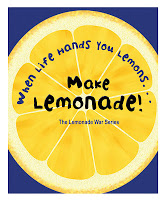
We often use the word “battle” in the context of our fight against childhood cancer, but we’ve waged a different kind of conflict in a new contest for schools – The Great Lemonade War. We’ve recruited award winning children’s book author Jacqueline Davies, who has authored a series of “lemonade” books – The Lemonade War, The Lemonade Crime and The Bell Bandit – to help us with this contest that challenges schools to compete against each other to see who can raise the most money through a lemonade stand project. The school that raises the most money for ALSF by the end of the contest will receive a visit from Jacqueline, as well as Liz or myself, in addition to other cool prizes. Please encourage any teachers, students or parents to check the contest out as it embodies two very important concepts – the value of reading and charitable giving. Jackie was kind enough to write a guest blog for us this week, which is below. It pretty much sums up what we’re all about here at ALSF, the impact of kids helping kids.
– Jay Scott, Alex’s Dad
I recently read an article in the Washington Post that listed the charitable giving in 2010 of each of the presidential candidates. The range was wide from a low of 1.8% of adjusted gross income to a high of 14.2%. The article noted that the numbers show “some very disparate charitable giving habits.” Which got me thinking about how we as Americans think about charitable giving and what we do about it.
Obviously we care about the charitable giving of a potential president. We consider it a reflection of the candidate’s character. It’s one more way to assess who this person is, deep down, to the very core. We look more favorably on those who give. So charitable giving is good. But it isn’t automatic.
There are conditions for giving and sharing, and one of the most important conditions, as discovered in a recent psychological study conducted at the Max Planck Institute in Leipzig, Germany, is shared work. The study revealed that when three-year-old children work together, but the “profits” of the work are distributed unevenly, the “wealthier” kids will spontaneously give to the less fortunate kids. Mind you, this spontaneous giving happened among three-year-olds, not a group that typically takes to “sharing” of any kind.
So, shared work triggers charitable giving. And charitable giving is both good and habit forming. It would follow that one way to promote
Which is exactly what the Great Lemonade War contest achieves. Children in schools all across the country are working together to raise money that they will then donate to fund research into treatment and new cures for childhood cancer. Not only is money raised for an important cause, but children develop the habit of charitable giving, which bodes well for our society in years to come.
Maybe thirty or forty years from now we’ll be voting for a presidential candidate who will recall his or her participation in the Great Lemonade War. – Jacqueline Davies
(Want to hear more from Jacqueline? Click here to watch a special video message from her.)
March 1, 2012

